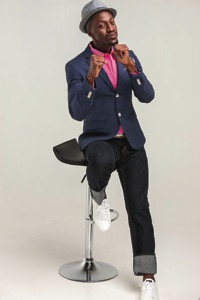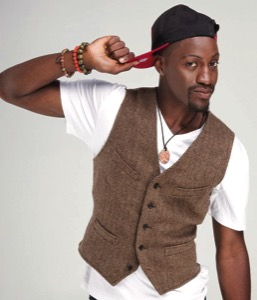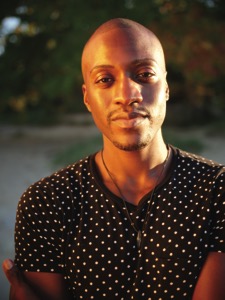
Award-winning LGBT stand-up comedian, writer and activist
Sampson McCormick, black and gay and watching his stock rise, this young man is among a new generation of LGBT activists helping to reshape the comedy landscape.
When it comes to inclusion, history will not look kindly on many black comedians. Taking their hyperbolic machismo ethos on stage, many of them – from Eddie Murphy and Bernie Mac to Tracy Morgan and David Chappelle – have used gay men as a punching bag for years. Their scorn has ranged from mild – Eddie Murphy’s routine on Ralph Kramden and Ed Norton if they were gay – to downright barbaric – Tracy Morgan saying he’d stab his son if he ever came out. Some, like Murphy and Morgan, have later apologized (or in Murphy’s case, much, much later). But too many black comedians continue to traffic in homophobic and transphobic humor for a quick laugh which audiences, especially black audiences, frequently roar in approval.
But Sampson McCormick, a native of rural North Carolina, has been quietly deconstructing the narrative that black comedians are hardwired to trash gay men and, more importantly, that an audience won’t relate to the goings-on of a gay black male. So whether he’s giving a historic performance at the Howard Theater in Washington, D.C. as the nation’s first openly gay black comedian or being considered for a Grammy nomination for ‘Best Comedy Album’ or being invited to the White House for his activism, McCormick is undoing the damage that others have laid at his feet; but always with a laugh and a smile and a good dollop of love.
His message for this particularly disruptive Pride season? Remember to laugh.
San Diego LGBT Weekly: How does being gay shape your comedy?
Sampson McCormick: I don’t think that being gay shapes my comedy. I think that it’s a small part of it, but I also like being relatable, and I think I do a good job of that. I have performed in Chicago, New York City, Atlanta, DC and Oakland. But I also headline and sell out small to mid-sized venues in places like Mississippi, Alabama, Iowa and Montana. (You know, places that black or gay folks don’t spend a lot of time vacationing in.) But folks come out to see me because I think that people everywhere get tired of seeing straight white men and the same old thing on TV and stage. Most of all, I think that funny is funny. And if you show up and make audiences feel like you appreciate them and put on a good show, that gets out and people show up to support you.
I’m not saying lesbians smelling like ‘sawdust’ might be misconstrued (a joke McCormick has used on stage), but is there a line you would never cross in order to make people laugh?
They do smell like sawdust! I love lesbians in the way that fag hag women love gay men. I don’t know what the lesbian lover equivalent term is, but whatever that is, I’m one of them. The lesbian community has been coming out for me, for years, so they know its all love. Plus, I’m nice to them anyway. You never know when [your] car might break down or something.
For the most part, my comedy is very light-hearted even when I am tackling some serious, deep shit. I grew up in a time when we made fun out of anything that we needed to in order to survive it. I don’t make rape jokes though and I don’t rag on people in the audience. Most other things, though, are fair game. I’m not politically correct. But I’m not an asshole either.

What was funny to you growing up?
I found humor in everything. I’m glad that I grew up in the last generation that was able to experience childhood without the Internet, and when we had to go outside and play. So we played the dozens – ‘Yo mama’ jokes – and we made fun out of being poor or not having both of our parents or whatever. That’s how we survived. I always got a kick out of my drunk aunt, showing up to family picnics and dinners, being loud and telling everybody’s business. I thought grown people were funny and I understood them.
I also watched lots of Whoopi Goldberg, Joan Rivers and Martin Lawrence, Redd Foxx. I loved In Living Color, Comic Relief, Def Comedy Jam and The Arsenio Hall Show. Those were the good days, back when shit actually had to be funny for people to laugh at it. The bar for comedy is so low these days and that’s why everybody thinks they can do it.
How do you get people around to your point of view when you’re standing on stage with a group of people you’ve never met?
I get people around to my point of view by simply being me and being real. I take my time with them, and I’m honest. Two things that people can tell are when you are comfortable with yourself (and people respect that), and people know when you’re bullshitting them. I just show up and I’m honest and make it a point to keep it real and have a good time. And they get it. If you’re genuinely funny, that helps too.
Are you close with your family?
Growing up, I wasn’t very close with my family. I didn’t think that they cared for me too much but all of that came from the issues that some of our parents had with each other. We grew up, and all of my cousins and siblings are coming out to my shows, and they text and call me a lot and keep in touch and we get along. So, we are getting there. I love my folks. And I’ve also created my own chosen family who take good care of me.
Do you ever bring them up in your routines?
I don’t talk about my family much on stage. I talk about my mom sometimes. I talk about my Aunt Jackie (that aunt who shows up loud and drunk at every family function) and she’s become a centerpiece of my shows. If I don’t talk about Aunt Jackie or tell some Aunt Jackie stories, people will tweet and email me, and let me know they don’t appreciate me leaving her out.
What is one question you wish more people would ask about you in interviews?

I get asked pretty much everything and folks who’ve kept up with me know that I’m pretty much an open book. I would like to have more platforms where I could talk about the issues that gay men, black gay men and people of color face on a regular basis. There are a lot of stigmas and myths that I’d like to use my voice to dispel, address and bring light to, from mental health issues, to the church, our sexual health, masculinity, how we deal with pain, to how and why we can be so shady to one another.
So much to talk about …
For more on Sampson McCormick visit sampsoncomedy.com











